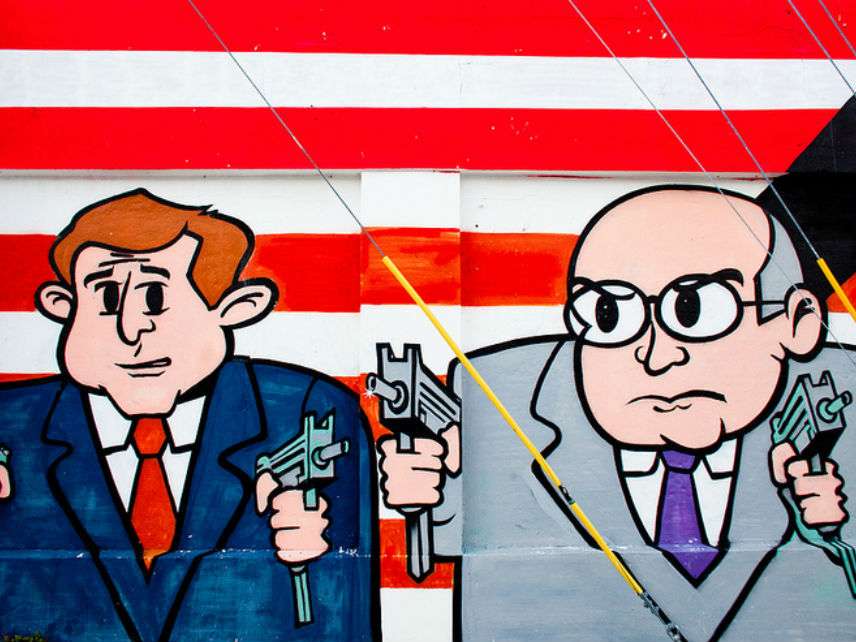Democrats Want Trump To Be More Like Bush…So He Could Actually Accomplish His Agenda?
Many of the underlying sentiments that made the statist post-9/11 bipartisan consensus possible are still in Washington, ready to be exploited.

A majority of Democrats—51 percent—now have a favorable view of former president George W. Bush, according to a recent poll. And in the wake of the truck attack in New York City, some in Democratic leadership are seized by the same curious nostalgia.
"When terrorism has struck us in the past, presidents have brought us together," Senate Minority Leader Chuck Schumer (D-N.Y.) tweeted, along with a photo of Bush with a firefighter at Ground Zero, shortly after 9-11. "It's a shame this president can't."
But it's not a shame.
What Democrats are really saying is that they hate President Trump so much that Bush, who during his presidency was even compared to Hitler, elicits fond memories.
It also brings the disconnect between the rhetoric lawmakers deploy and the policies they pursue in stark relief.
Even as they stuck to the typical partisan script to attack Bush during his presidency, Democrats supported such policy failures as the Iraq War, the PATRIOT Act, and the creation of the Department of Homeland Security, when there was an opportunity to stop them.
Whatever authentic momentary feelings of national unity post-9/11 that Bush might have stirred in people, they weren't worth the terrible policy outcomes.
Bush's conciliatory rhetoric simply provided cover for Democrats to support illiberal policies in the name of "national security" while pretending to maintain a distance from him in their own rehetoric.
President Trump, on the other hand, doesn't take that tack. He spent the aftermath of the NYC terror attack the same way he spends a lot of his time in the public eye, sniping at his perceived enemies and making bombastic statements that rile up his and the oppostition's base.
Trump doesn't try to mask the ugliness of his policy proposals in the flowery language of unity and higher purpose.
His unwillingness or inability to dress up the talk is a positive development: were he more adept at it, it would only help to form the kind of bipartisan consensus under which such policies would get broad approval without much, if any, substantive debate.
While Bush took care in his rhetoric not to blame all of Islam for 9/11 nor to stray from the ideal of America as a nation of immigrants, this was not reflected in many of the broadly supported policies unrolled in the aftermath.
In the sixteen years since 9/11, both parties have supported an increasingly expansive war on terror that is waged in Muslim countries around the world and, through surveillance and other measures, is also waged against Americans themselves.
And as the Migration Policy Institute noted on the ten-year anniversary of the 9/11 attacks, the immigration landscape transformed dramatically in the decade since—policy was viewed primarily "through the lens of national security." Stricter immigration controls of all kinds enjoyed broad bipartisan support.
At the same time, the consensus after the 9/11 attacks did not include any substantive interest in comprehensive immigration reform. It did, however, extend to mass surveillance and a global war on terror, much of which was solidified during the Obama presidency.
Eleven of the Democratic senators who voted for the PATRIOT Act in 2002 are still in office, including Schumer, the minority leader, who also voted in favor of the Iraq War and the creation of the Department of Homeland Security.
Since 9/11, terrorist attacks have become decentralized—far less deadly, their mundane targets and tactics make them relatively more common. While the odds of an American being killed in a terror attack are still overwhelmingly long, the political class is just as susceptible to policy-making as emotional reaction as ever before.
Trump, like his 2016 opponent Hillary Clinton, suggested on the campaign trail "closing that internet up in some way" in response to what was perceived to be radicalization online. There is bipartisan eagerness in imposing more controls on the internet and internet companies in the name of national security.
Trump's unwillingness or inability to tone his rhetoric down to take advantage of that eagerness to advance his own agenda should be a welcome development to any skeptic of the policies wrought by the war on terror so far.


Show Comments (74)